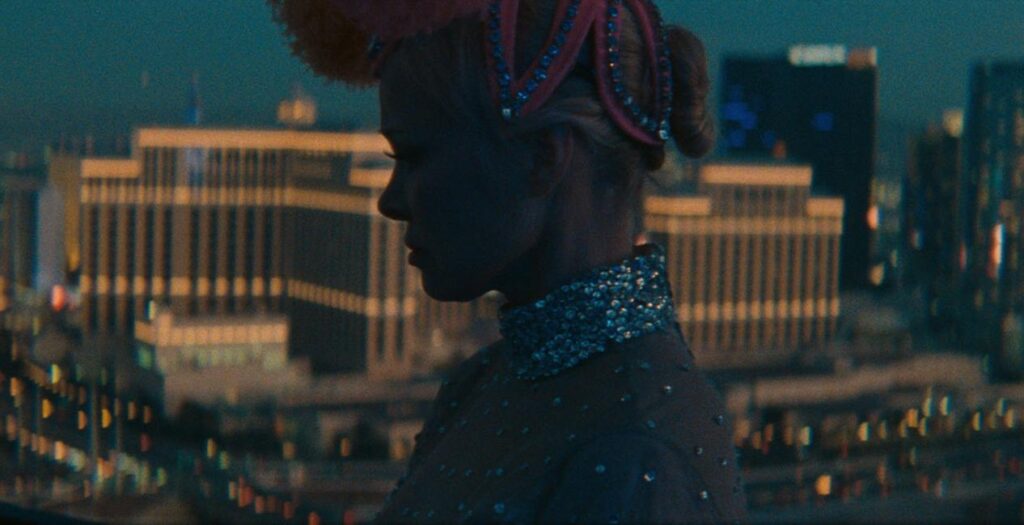Pamela Anderson unleashes a crushingly vulnerable, megawatt smile in the opening moments of Gia Coppola’s contemplative, visually intoxicating The Last Showgirl that defines the remaining film’s tone. In a career-defining role, Anderson brings raw grace and texture to Shelly, a Las Vegas dancer for the Razzle Dazzle, a show that, like its heroine, has long since hit its peak stardom.
The film delicately picks away at the artifice of the strip and the way expectations and dreams blind us from reality. In equal measure, Shelly is a dreamer and delusional—though perhaps a certain level of delusion is required to enable us to chase our dreams. She’s an egotist and a victim of her own narrative. The combination makes for a stunning portrait of a woman crumbling under the weight of a poorly lit fantasy, drawing back the curtains, smiling to endure.
Written by Kate Gersten, The Last Showgirl wastes little time establishing who Shelly is, even though she goes through a tumultuous journey throughout the brief 85-minute runtime. As played by Anderson, she’s flighty but warm, relying on two of the younger women she works with—played by Kiernan Shipka and Brenda Song—who also see her as a mother figure.
Her presence comforts them, but they can never quite look at the stage they spend their days on as if it were anything other than a job or opportunity. Shelly tries to romanticize it, while the other two, especially Song’s Marianne, level Shelly’s optimism with cynicism. In contrast, Shipka’s Jodie simply tampers her disagreements— too fresh, bright-eyed, and looking for someone to lean on. In some ways, her naivety is equally met by Shelly.
The crux of the story arrives when Shelly learns that the show she’s staked her life on is closing in two weeks. This opens up a wave of resentment and insecurity as she watches the other girls audition for different roles on the strip. At the same time, she clings to her history as a star of the Razzle Dazzle, a title that, no matter how she dresses it up, never seems more than a relic. Her vibrancy shines once the strip lights come on but diminishes in the light of day, where everything is much more muted and sparse.
Her descent is messy and stressful, as we witness her continual self-sabotage to hold close to what she considers her defining aspect. This is true with her daughter, Hannah (Billie Lourd), who keeps her mother at a rightful distance, unable to understand why this job that brings in weak crowds trumped her role as a mother. Her selfishness unravels in her friendships, too, as we watch her sabotage the camaraderie she’s made as she twirls and spins against the backdrop of classic productions projected on her walls.
She’s seeking glamour; there’s certainly a star quality to Shelly, amplified by Anderson’s natural charisma and poise. Shelly and her friend Annette (an excellent Jamie Lee Curtis) highlight the sexism women face in the industry. Their appeal goes hand in hand with their youth. And while their beauty remains, being over 40 has made them replaceable outside of backup dancers and casino cocktail servers, and even those opportunities are waning.
Coppola and Gersten deftly handle the genuine hardships Shelly faces without ever excusing her behavior. The beauty standards and expectations of women are brutal, but Shelly is also destructive and self-absorbed. She lashes out at her daughter, or producer Eddie (a reserved, quietly affecting Dave Bautista who continues to surprise with his depth as a performer) because she’s unable to look inward, lest her sparkle dim. Coppola’s direction keeps things personal; the camera is tight and unwavering as we watch Shelly buckle.
The only detriment is the abundance of establishing shots and transitional sequences where Shelly stands against the backdrop of Las Vegas. These moments are compelling but only sparingly. The cinematography by Autumn Durald Arkapaw is lush and picks up the enticing beauty of the strip at night. The framing always presents Las Vegas as this looming entity where people chase and mourn dreams. The film strikes a delicate balance as it makes sure to visually relay just why Shelly would be so tethered to it while reminding us constantly that its barren, dry landscapes only continue to suck her and others dry.
While the dreamlike aesthetic is relied on too often in the in-between moments, The Last Showgirl comes to life through the rich textures of its artistic leanings. From the score by Andrew Wyatt to the intricate costumes that possess life and movement, there’s not a moment in the film where the story rests. It’s in constant motion—even the glitter that adorns Shelly’s body offstage helps propel the story forward as a woman who always wants to shine bright.
Ultimately, however, this is Anderson’s star moment, in a role that anyone else couldn’t have played with the same level of vulnerable authenticity. So vivacious is her performance, so wounded, that it seems as if we’re peeling back layers of her own life. And, to a degree, considering the type of limelight she’s faced and the sexism lobbed her way for decades, we might as well be.
But, as The Last Showgirl shows, there’s always so much beyond the glitz and glamor. Anderson imbues Shelly with a shocking amount of interiority so that we viscerally bear the brunt of her missteps. Her performance grants ferocity to grace, her movements light and balletic, and her affectation and demeanor are timelessly girlish, but they’re undercut with self-righteous rage.
The Last Showgirl delivers a superb launching pad for an actress in a new career era. Anderson stuns in this introspective and bruising portrait of a woman who refuses to let go of a bygone era, too wrapped up in the would’ve and could’ve’s of her life to take stalk where she is in the now. With melancholy and an abundance of compassion for its lead, Coppola delivers a film that is as biting as it is empathetic and is all the more heartbreaking because of it.
The Last Showgirl played as part of the 2024 Toronto International Film Festival.
The Last Showgirl
-
Rating - 8/108/10
TL;DR
The Last Showgirl delivers a superb launching pad for an actress in a new era of her career. With melancholy and an abundance of compassion for its lead, Gia Coppola delivers a film that is as biting as it is empathetic and is all the more heartbreaking because of it.







